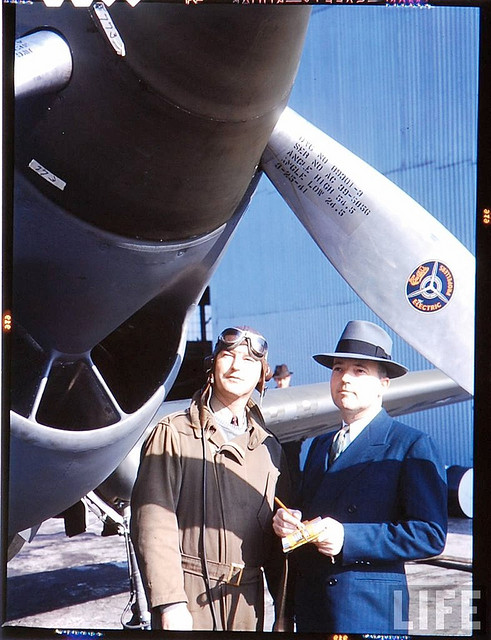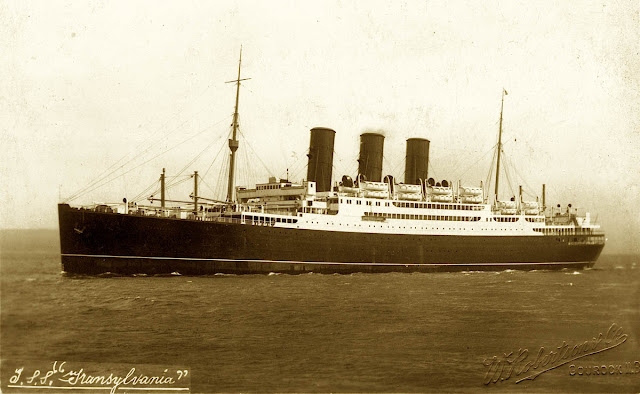Thursday 4 April 1940
 |
| Queen Wilhelmina reviews a military parade of the 3rd Division troops stationed at Noordwijk and Katwijk. Here, she is reviewing bicycle troops of the 1st Squadron stationed at Katwijk. |
Operation Weserubung: German transports have set sail for the far reaches of Norway as Operation Weserubung, the German invasion of Denmark and Norway, begins. The date of the invasion is set for 9 April 1940.
Battle of the Atlantic: Operations remain relatively quiet - too quiet - on 4 April 1940 because the U-boats are aiding Operation Weserubung instead of attacking merchant ships.
The Norwegian passenger liner "Mira" reaches Norway after its 107 passengers and crew have suffered numerous (failed) Luftwaffe attacks during its 6-day crossing.
Convoy OA 123GF departs from Southend, Convoy OB 123 departs from Liverpool.
European Air Operations: The RAF sends up bombers to attack German destroyers at the Jade estuary at Wilhelmshaven.
RAF Sunderland flying boats encounter six Stukas (Ju 87) over the North Sea. They shoot one down and force another to crash-land in Norway.
Western Front: It is raining heavily all along the front, so little action.
Royal Navy: Admiral Horton continues sending his submarines to patrol on the likeliest routes from Germany to Norway. HMS Snapper departs today from Harwich to the Skagerrak. Horner also commands allied submarines, so he sends French subs Amazone and Antelope from Harwich to patrol the Frisian Islands and Heligoland.
First Lord of the Admiralty Winston Churchill is flummoxed by the French intransigence about cooperating with mining activities in the Rhine (Operation Royal Marine). He flies to Paris and makes a decision: "[Operation] Wilfred should go forward notwithstanding the French refusal of Royal Marine (mining of the Rhine)." The British War Cabinet concurs.
US Military: Curtiss-Wright’s Chief Test Pilot H. Lloyd Child flies the first production P-40 Warhawk, c/n13033, Air Corps serial number 39-156, at Buffalo, New York. The cruising speed of the P-40 is 272 miles per hour (438 kilometers per hour) and the maximum speed is 357 miles per hour (575 kilometers per hour) at 15,000 feet (4,572 meters). The Warhawk has a service ceiling of 30,600 feet (9,327 meters) and the absolute ceiling is 31,600 feet (9,632 meters). The range is 950 miles (1,529 kilometers) at 250 miles per hour (402 kilometers per hour). These are all good figures for 1940, and the Air Corps designates the fighter as "pursuit."
German/Italian Relations: Hitler authorizes staff talks between the OKW (military high command) and Italian Commando Supremo.
French Government: The Minister of Marine reports that the French Navy has destroyed 23 U-boats during the conflict. In actual fact, the number is well below a dozen, and none of those were due to the French Navy.
The government sentences 34 French communists to five years in prison. Eighty others receive 4-year suspended sentences. The charge is illegally attempting to reorganize the banned Communist Party. It is now illegal, subject to the death penalty for treason, to read or spread communist or anti-war propaganda.
British Government: The Chancellor of the Exchequer announces that the government has set up a special trading corporation backed by the Treasury to foster economic penetration of the Balkans, which trade Germany dominates.
Soviet Government: The NKVD reports to Molotov: out of the 22,000 Polish officers, 395 are "of value" and thus should be spared. The rest should be liquidated per the Politburo's decision of 5 March 1940. The way to get on the "of value" is to be an informer in one of the camps, or to have some foreign connection that would make their sudden absence noticed abroad.
German Homefront: Reichsmarschall Hermann Goering broadcasts an appeal to the nation's young to behave with decency and morality "not only in the light of day but also in the blackout."
British Homefront: Prime Minister Chamberlain takes a little-used expression (first used in George Reid's "My Reminiscences" (1917)) and takes it to the next level. Before an audience of friends, he for once exceeds Winston Churchill's oratorical heights by stating that Hitler has "missed the bus" by running afoul of the British empire and not destroying it when he had the chance. He is now "ten times" as confident of final victory as he had been in September. He states that it is "extraordinary no such attempt was made" to invade during the fall.
By point of fact, of course, the bus, er, boats indeed had set sail - Nazi transports were at that moment on their way to Norway.
Rather oddly, the British newspapers comment upon large concentrations of German troops at Kriegsmarine bases. Nobody in the Allies' military services appears to find this of interest.
China: The Chinese 8th War Area, having recovered Wuyuan and other objectives, changes to the defensive. The Winter Offensive is now for all intents and purposes over. It was a huge success, bringing down the Japanese government and sending Japanese forces reeling.
Summary of the Chinese Winter Offensive:
- Japanese military casualties: 50,000;
- Chinese military casualties: 150,000;
- Chinese civilian casualties: unknown.
 |
| 4 April 1940: Curtiss-Wright’s Chief Test Pilot H. Lloyd Child flies the first production P-40 Warhawk, c/n13033, Air Corps serial number 39-156, on its first flight at Buffalo, New York. |
April 1940
April 1, 1940: Weserubung is a GoApril 2, 1940: British Subs On Alert
April 3, 1940: Churchill Consolidates Power
April 4, 1940: Missed the Bus
April 5, 1940: Mig-1 First Flight
April 6, 1940: Troops Sailing to Norway
April 7, 1940: Fleets At Sea
April 8, 1940: HMS Glowworm and Admiral Hipper
April 9, 1940: Invasion of Norway
April 10, 1940: First Battle of Narvik
April 11, 1940: Britain Takes the Faroes
April 12, 1940: Germans Consolidate in Norway
April 13, 1940: 2d Battle of Narvik
April 14, 1940: Battle of Dombås
April 15, 1940: British in Norway
April 16, 1940: Germans Cut Norway in Half
April 17, 1940: Trondheim the Target
April 18, 1940: Norway Declares War
April 19, 1940: Dombås Battle Ends
April 20, 1940: Germans Advancing in Norway
April 21, 1940: First US Military Casualty
April 22, 1940: First British Military Contact with Germans
April 23, 1940: British Retreating in Norway
April 24, 1940: British Bombard Narvik
April 25, 1940: Norwegian Air Battles
April 26, 1940: Norwegian Gold
April 27, 1940: Allies to Evacuate Norway
April 28, 1940: Prepared Piano
April 29, 1940: British at Bodo
April 30, 1940: Clacton-on-Sea Heinkel
2016




